Twenty years ago, in April 2001, the President of Kazakhstan paid his first official visit to Norway. Nursultan Nazarbayev’s visit to Oslo laid the foundation and set the central dynamics of cooperation with this Scandinavian country. Kazakh and Norwegian diplomats discuss the historical significance of the first visit and the prospects for Kazakh-Norwegian relations.
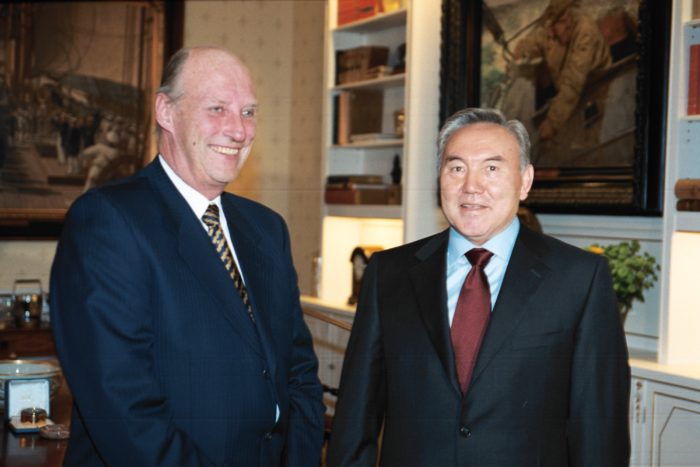
Kazakhstan’s First President Nursultan Nazarbayev and King of Norway Harald V. Photo credit: Archives of the Library of the First President of Kazakhstan – Elbasy.
Adil Akhmetov, Ambassador of Kazakhstan to the UK and Norway concurrently in 2000-2002:
– Twenty years ago, Kazakhstan had no diplomatic presence in Oslo. At that time, I was Kazakhstan’s ambassador to several Western European countries concurrently, including in Norway, with a residence in London. Therefore, I was directly involved in the substantive and organizational issues of the first official visit of President Nazarbayev to the Kingdom of Norway in April 2001.
During the visit, the President had a meeting with King Harald V, fruitful negotiations with Prime Minister Jens Stoltenberg, and Acting President of the Storting (Parliament) Hans J. Røsjorde. Mr. Nazarbayev also addressed the Norwegian Institute of International Relations (NUPI) and met with business leaders.
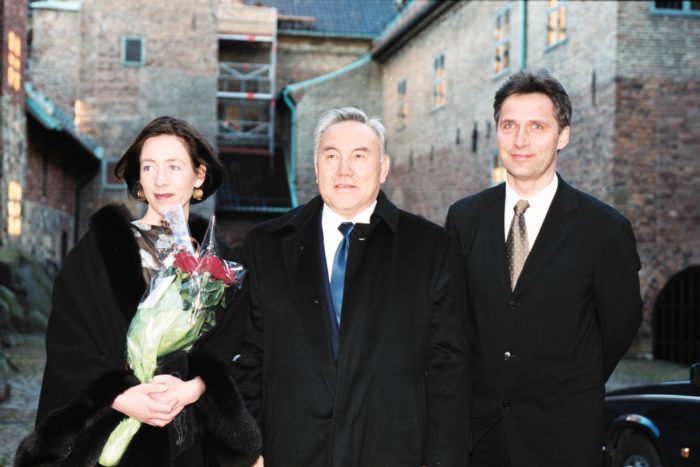
Kazakhstan’s First President Nursultan Nazarbayev during a joint photo with Prime Minister of the Kingdom of Norway Jens Stoltenberg and his spouse. Photo credit: Archives of the Library of the First President of Kazakhstan – Elbasy.
Among the documents signed during the visit was a statement on the further development of friendly relations and cooperation between Kazakhstan and Norway and a convention on the avoidance of double taxation and the prevention of tax evasion on income and capital.
Norway is not just a developed, prosperous European country. It is interesting for us because it is the most successful oil and gas producing state. In 2001, Kazakhstan marked the tenth anniversary of its independence. Our nation has just paid off its debts to the IMF, acquired the market economy status, and, in general, was entering a growth trajectory. We needed a long-term sustainable development model. Thus it was natural that the First President Nazarbayev turned his primary focus on Norway. In the 1990s, the national company Kazakhoil (later Kazmunaigaz) and, in the 2000s, the National Fund, which accumulates revenues from the extraction of natural resources, were created mainly under the Norwegian model.
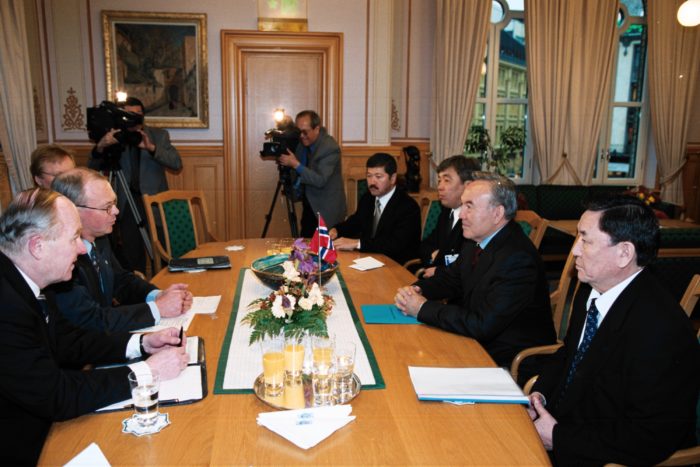
Kazakhstan’s First President Nursultan Nazarbayev met with President of the Storting (Parliament) Hans J. Røsjorde. Photo credit: Archives of the Library of the First President of Kazakhstan – Elbasy.
“We looked at the successful example of Norway where an oil fund has existed since 1990, thanks to which firstly the economy of this Scandinavian state managed to avoid ‘overheating’, secondly, a stabilization reserve was created; thirdly, the saved funds were kept for future generations. It is important to note that the Kazakhstan was the first of the newly independent states to create a National Fund,” Nursultan Nazarbayev says in the book “The Era of Independence”.
Twenty years later, we can confidently say that those accents of long-term relationships remain relevant to this day. In addition to a thriving oil and gas sector, today Norway is a model for introducing a low-carbon economy, a state with a robust social system, and advanced business responsibility standards. These important areas are in the modernization plan of President Kassym-Jomart Tokayev. I think, as an example of development, Norway is of strategic interest for Kazakhstan.
Yerkin Akhinzhanov, Ambassador of Kazakhstan to Norway
– The foundations laid during the first official visit of the First President of Kazakhstan – Elbasy, Nursultan Nazarbayev, to Norway rightfully serve as a long-term basis for developing bilateral cooperation between our countries.
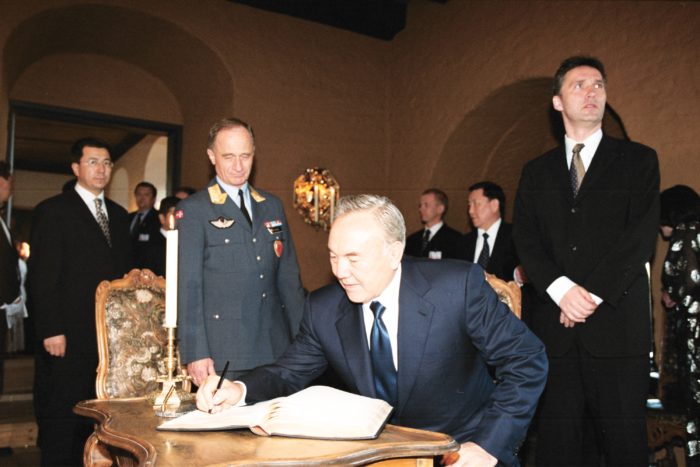
Kazakhstan’s First President Nursultan Nazarbayev signs the Book of Distinguished Guests of the Palace of the Prime Minister of the Kingdom of Norway. Photo credit: Archives of the Library of the First President of Kazakhstan – Elbasy.
We have a common stance on almost all international issues, especially in terms of strengthening multilateral institutions’ leading role. Norway today is a member of the UN Security Council, an active sponsor of conflict resolution, international development, and one of the largest donors to the World Health Organization.
Kazakhstan and Norway make a significant contribution to the cause of non-proliferation and nuclear disarmament and are essential players in the field of atomic energy. Norway is one of the donors of the International Low-Enriched Uranium Bank Project.
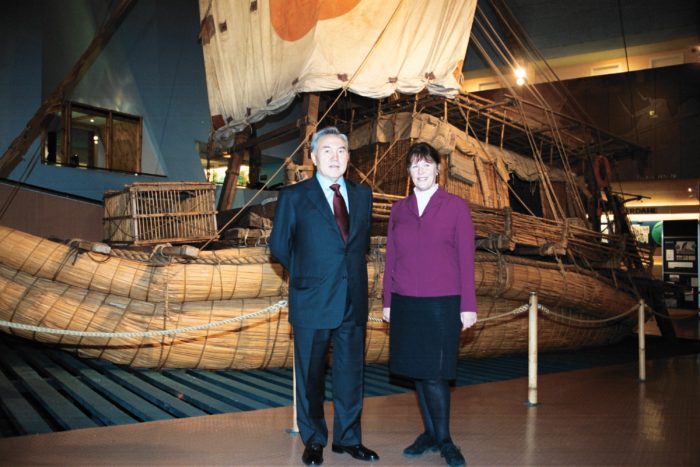
Kazakhstan’s First President Nursultan Nazarbayev paid a visit to the Kon-Tiki Museum. Photo credit: Archives of the Library of the First President of Kazakhstan – Elbasy.
As one of the largest exporters of hydrocarbons, Norway is of great interest to Kazakhstan in terms of developing the oil and gas sector. Our government carefully studied Norway’s experience during the creation of the National Fund of Kazakhstan. Kazakh oil and gas specialists work and receive qualifications in Norway. Norwegian service companies are involved in servicing the oil and gas industry in Kazakhstan.
Currently, there are 25 legal entities, branches, and representative offices with Norwegian participation in Kazakhstan. In 2019, in Nur-Sultan, Kazmunaigas and Norwegian Equinor agreed on joint geological research. In general, bilateral projects in oil production, the provision of oilfield services, aquaculture, animal husbandry, and the development of alternative energy are underway. Norwegian fish and Kazakh grain dominate mutual trade. The Council of the Norwegian-Kazakh Chamber of Commerce and Industry operates to enhance economic cooperation.
Last year, a container rail link was launched between the North of Norway and China via Kazakhstan.
Joint projects are being implemented to study the ancient and medieval history of Central Asia and Scandinavia. In the 2000s, Norway sponsored and sent specialists to Tamgaly petroglyphs’ conservation in the Almaty region.
The embassy is working to perpetuate the memory of the Kazakhs who participated in the liberation of Northern Norway in 1944 and search for burial sites and publish the names of soldiers of Kazakhstan who died in captivity in occupied Norway during the war.
This year the Book of Words and Selected Poetry of Abai in Norwegian will be published.
Mette Kongshem, Norwegian diplomat, former Ambassador to Kazakhstan
– Every day, we are reminded that war and conflict characterize the news picture, both between countries and ethnic and religious conflicts within many countries. Then it is encouraging that there are also countries that excel in stability and economic development despite ethnic and religious diversity. One such country is Kazakhstan, a nation in Central Asia. The country, which is the size of Western Europe, is a young nation-state, where many different ethnic groups live well together, side by side.
These days 20 years ago Kazakhstan’s first President, Nursultan Nazarbayev, came to Norway on the first official visit. This Central Asian country is far from Norway, but this important visit laid the foundation for close and good cooperation between our two countries in all the years since. The visit not only put Kazakhstan on the map for Norwegian politicians and Norwegians in general, but we also became more aware of the importance of Central Asia, where vital geopolitical and economic interests converge.
Kazakhstan became independent in 1991 after the collapse of the Soviet Union. It was a formidable task the country then faced. The state structures were to be filled with content, and a nation-state and a national consciousness were to be built in a multiethnic population. The country’s resource base was to be secured through national oil ownership in and around the Caspian Sea. Nursultan Nazarbayev’s nation-building project became a success. It has been a search for the roots and bringing out historical figures and events, culture, and traditions that could help build up under the state’s legitimacy. Nazarbayev relied on religious tolerance and dialogue between faiths as an instrument to keep the country united and stable.
The history of Kazakhstan after 1991 is a story of Nazarbayev. As a skilled politician and strategist, he has ruled Kazakhstan with political flair and a determined hand. He reformed the economy, quickly advocated a market economy, established a national currency, tightened and secured the country’s international recognition and investment. He understood that to ensure Kazakhstan’s stability in a region with great powers such as Russia and China as neighboring countries and a troubled Afghanistan in the south, it was essential to pursue a balanced policy internationally. His multi-vector approach has led to Kazakhstan having good and close cooperation both with the countries in the region and with the USA and the EU. It has been important for Nazarbayev that Kazakhstan should be active in the international arena and seek international organizations’ membership. Kazakhstan has held the chairmanship of the Organization for Security and Co-operation in Europe (OSCE) and worked closely with Norway in preparation for this important position. Kazakhstan has also made significant contributions as a non-permanent member of the UN Security Council. And when Norway was an applicant for the Security Council, Kazakhstan was an active supporter.
When Nazarbayev came to Norway in April 2001, he also sought to reap Norway’s experience as an oil nation, and precisely in the energy sector, cooperation between our two countries has been essential. Events at a political level and many business contacts have also contributed to strengthening our two countries’ good relations.
Furthermore, the legacy of the Soviet Union has weighed in many ways. Kazakhstan had been the Soviet Union’s nuclear weapons laboratory. At independence in 1991, Kazakhstan had the world’s fourth-largest arsenal of nuclear weapons. President Nazarbayev quickly decided to give up these weapons. Kazakhstan was not to become a nuclear power. On the contrary, the country has since played an essential role in international disarmament work.
It has been important for the country’s first president to have a centrally controlled and step-by-step democratization process. Nazarbayev’s mantra has always been that Kazakhstan must first ensure economic growth and consolidate stability. The time may come to introduce a more democratic form of government, “the Kazakhstan way.” It is easy to forget that during these 30 years since independence, Kazakhstan has had to squeeze together a process that Western countries have spent many centuries implementing. There is still a long way to go, but under the new President, Kasym-Jomart Tokayev, steady progress is being made. And perhaps this focus on stability both within the country and in the region has meant that Kazakhstan has been able to play an essential role in various peace and stabilization processes. Kazakhstan is perceived with respect internationally, and for Norway, cooperation with Kazakhstan will be further strengthened in the years ahead.
Aigul Kuspan, Chairwoman of the Committee on International Affairs, Defense and Security of the Mazhilis of the Parliament of the Republic of Kazakhstan
At that time, I headed the Western Europe desk at the Foreign Ministry and was directly involved in working out the visit. For Kazakhstan, the visit became an acquaintance with Scandinavia, and for the Norwegians – the opening of a new independent state – Kazakhstan.
Therefore, the visit’s program was quite active: in addition to official meetings with the King and the Prime Minister, Head of State Nursultan Nazarbayev visited the Norwegian Parliament (Storting), the famous Oslo City Hall, spoke at the Norwegian Institute of International Relations. The president also participated in a round table with Norwegian companies representing oil and gas sector, telecommunications, shipping, tourism, and construction. Mr.Nazarbayev spoke about the results of the first ten years of reforms in independent Kazakhstan, its approaches to international affairs, and investment opportunities in our country.
This visit was followed by a series of reciprocal bilateral visits, including visits by Prime Minister of Norway Kjell Magne Bondevik of Kazakhstan in 2004 and Crown Prince Magnus in 2010. The states exchanged embassies.
In my opinion, President Nursultan Nazarbayev set clear accents during his first visit to Oslo twenty years ago. Norway remains the most successful example of developing the oil and gas sector, green energy, and environmental protection. Also, Kazakhstan and Norway are active players in multilateral structures, contributing to peace, security, and sustainable development.
In terms of prospects, I would like to emphasize the importance of the development of inter-parliamentary dialogue. Kazakhstan continues to build a democratic and free society. Starting in 2019, President Kassym-Jomart Tokayev began implementing new reforms to modernize the political system and guarantee human rights. These measures provide for the legal consolidation of the institution of the parliamentary opposition, a 30 percent quota for women and young people on the electoral lists of candidates of political parties, the decriminalization of defamation, the liberalization of peaceful assemblies, and others.
Dialogue and exchange with Norwegian parliamentarians are of great interest to us. The Mazhilis of the Parliament of Kazakhstan is ready to interact with the Norwegian Storting both on a bilateral basis and within the OSCE Parliamentary Assembly and other fora.
Ole Johan Bjornoy, Norway’s former Ambassador to Kazakhstan
By studying the joint declaration on the further development of bilateral relations and cooperation between Kazakhstan and Norway, which was signed during President Nazarbayev’s visit to Oslo in 2001, one gets a good understanding of the progress since then in cooperation both bilaterally and multilaterally and sees how dynamic it has evolved. This applies not least in disarmament and non-proliferation, which has been a common thread in the collaboration.
President Nazarbayev hosted an annual reception for the ambassadors stationed in Kazakhstan, around 70 in the century, about as many ambassadors stationed in Norway. He then gave a briefing on the state of the nation, with the subsequent opportunity for the individual ambassador to exchange a few words with him about cooperation between the countries.
I remember the reception in 2016. I mentioned our cooperation in disarmament and non-proliferation, where Norway and Kazakhstan at the end of 2015 worked closely together to contribute to Iran’s nuclear agreement and referred to the collaboration in the energy field. Finally, I mentioned a research project on the origins of ancient Europeans. With his usual whimsical humor, he wondered: “Are you from here or are we from there?”
The reason was that Norwegian researchers visited Kazakhstan in the autumn of 2015 as part of a Scandinavian project to find out more about the origins of the ancient Europeans. DNA from burial mounds (kurgans) on the steppes was collected and analyzed.
“Nomads of seas” and “nomads of steppes” are used in several contexts to compare our two countries’ peoples – always on the move to find new paths to wealth and development. Our countries are also equal in size when sea areas are included – also the sea area around Bouvet Island in the South Atlantic – around 2.7 million square kilometers. The comparison is reasonable since both countries extract large parts of their wealth from below the earth’s surface and the sea. Kazakhstan is one of five coastal states on the Caspian Sea that is home to the world’s most valuable fish species, the sturgeon. Norway has very developed and sustainable collaboration with our common great neighbor, Russia, on managing resources in the world’s most affluent sea areas. The sturgeon, which together with the salmon is considered the world’s most noble fish species, also has excellent growth potential with sustainable management.
That “culture brings cultures together” is more than a phrase. A cultural area where Norway from the 1970s became aware of Kazakhstan was the skating records set on the Medeo stadium in the mountains near Almaty and where the four Ss: Stensen, Storholt, Stenshjemmet and Sjøbrend also made a name for themselves. It was like another common thread in our countries’ relations when Vladimir Smirnov won five km in the Olympics in Lillehammer, and “Smirre” became the mascot of all of Norway.
In my eight years as Norway’s ambassador to Kazakhstan, the sporting events were memorable experiences, from the junior WC in combined in 2015 in Almaty, where «Smirre» was also present and inspired, to the football match in Shymkent between the city team and the women’s team from Røa in Oslo.
I look ahead and hope to be able to sit in the hall when the singer Dimash Kudaibergen, who is characterized as a world sensation due to his voice and falsetto, will hopefully soon come to Norway.

